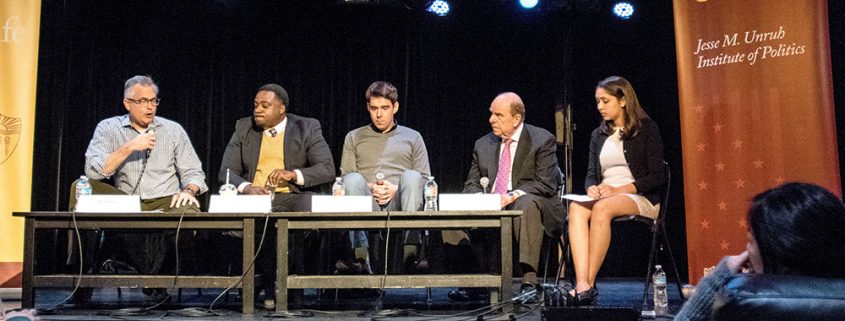Unruh Institute discusses Donald Trump’s developing economic plan
A group of political and economic professionals debated the nation’s current economy Tuesday evening at Ground Zero Performance Café.
The event, moderated by Unruh Institute Director Robert Shrum and USC Undergraduate Economics Association board member Aditi Jackson, introduced the audience to a broad view of opinions on the future of the U.S. economy under President Donald Trump’s leadership.
The USC Undergraduate Economics Association and the Unruh Institute hosted the discussion, which featured Orange County Register Opinion Editor Brian Calle, Klink Campaigns President Matt Klink and Los Angeles County Federation of Labor Director of Policy Kokayi Kwa Jitahidi.
Calle said that despite the social fear caused by Trump, some of his economic policies are logical. He told the panel and audience about a conversation he had with one of House Speaker Paul Ryan’s closest aides, where he expressed his economic views regarding the nation’s current stance.
“We need to focus on fixing Obamacare and tax cuts, and make the economic issues and healthcare issues forefront, and rebrand the Republican Party,” Calle said.
Jitahidi viewed Trump’s ideologies differently. He remarked that economic growth does not equate to more jobs, as it is due to increased globalization. He said that the economy of the United States relies on manufacturing, where there is wage theft, and that capital will maximize their profits.
“We call this Reaganomics,” Jitahidi said. “History says that we are likely going to end up with a lot of debt because when you cut taxes, you cut revenue to the government.”
Both Klink and Calle opposed this view. Klink stated that the Barack Obama economy did not promise economic growth and did not facilitate it, and that capitalists on Wall Street feed on lower taxes and decreased regulation. He then shifted the issue from capitalism to middle class Americans who voted for Trump because they sought economic healing.
“The folks in the middle of the country, they are so desperate for anybody who can help them and neither party has been able to,” Klink said. “They will vote for anybody who appears to be that change. In 2008, Barack Obama was that change. In 2016, Hillary Clinton was a third term for Barack Obama, and people said this is not going to cut it.”
On the issue of the possible reappeal of the Affordable Care Act, Klink stated that there would most likely be a reappeal before a replacement. He argued that most of the issues of Obamacare derived from the increase in the cost of other insurances due to the implementation of cheaper insurance for those under Obamacare. Meanwhile, Klink said that some people want to forget Obamacare and go toward single-payer insurance because it benefits them more.
“What [Trump] may be doing is reinvigorating a progressive movement that will go beyond 2018,” Jitahidi said.

